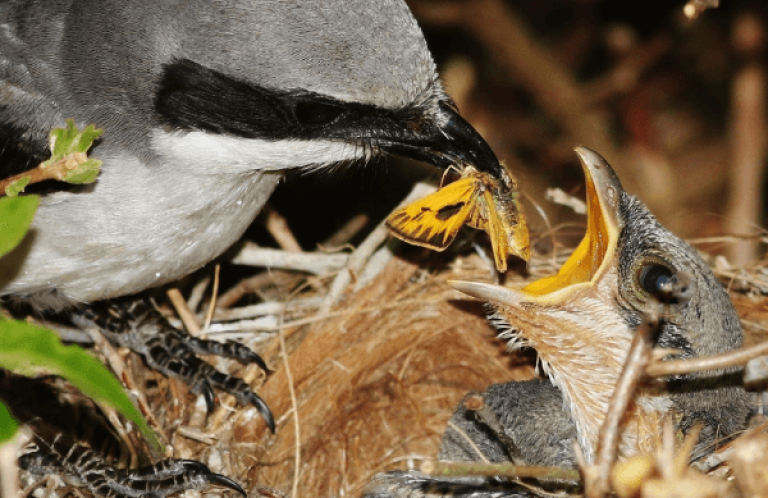EPA Decision Maintains Dangerous Regulatory Loophole for Pesticide-Coated Seeds

The Environmental Protection Agency (EPA) today denied a petition request from American Bird Conservancy (ABC) and other parties seeking to change a dangerous regulatory loophole for pesticide-coated seeds. Instead of regulating these coated seeds as the agency does other pesticide uses, the EPA says it will review labeling language and requirements as well as conduct a general review of seed treatment use. The EPA also announced that it “may explore the option” of issuing a rule to ensure coated seeds are used properly — a process that could take years to have any meaningful impact.
This decision means that pesticides applied as a seed coating will continue to be used without being tracked, quantified, or regulated like other pesticides. It has been made in spite of scientific evidence that seeds coated with particularly toxic insecticides called neonicotinoids (neonics) are known to kill birds like Red-winged Blackbirds, invertebrates, and other wildlife while providing little benefit to most crops.
“We are extremely disappointed by this news,” said Hardy Kern, Director of ABC's Pesticides and Birds Campaign. “The EPA's decision will continue to jeopardize millions of birds that are at risk from ingesting neonic-coated seeds and/or losing insect prey to the pesticides' environmental effects.”
Pesticide-coated seeds are the number-one use of neonics. When ingested, a single neonic-coated seed can kill a songbird. But the danger to birds doesn't stop there. Just 2 to 20 percent of the chemical is taken up by the plant as it grows — the rest leaches into soil and groundwater, where it kills invertebrates that birds rely on for food and that people need for crop pollination.
The indiscriminate killing of invertebrates could pose an even greater threat to birdlife than direct poisoning. A study in the Netherlands revealed sustained bird population declines near areas where farms used neonic-coated seeds.
There is little evidence that the benefit to crops is worth the environmental cost. Studies show that neonic-coated seeds provide limited protection to cash crops such as corn and soy — they might even decrease yield in certain cases. For instance, a 2014 laboratory study found that a neonic insecticide applied to soybean seeds left slugs (a common pest) unaffected but killed predatory beetles that control pests.
Yet, coated seeds are the most poorly regulated pesticides. This is due to the “Treated Article Exemption,” introduced to the Federal Insecticide, Fungicide, and Rodenticide Act in 1988. The amendment makes so-called “pesticide-treated articles” exempt from registration, labeling, and tracking. Because of this loophole, farmers might not even know whether they are buying treated seeds or not.
In 2017, ABC teamed up with nonprofits representing pollinator health and food safety to challenge this status quo. The coalition petitioned the EPA to track and regulate coated seeds like other crop pesticides. After the EPA failed to respond, members of the petitioning group filed a formal complaint in December 2021.
As a result of that complaint, in July of this year, the EPA released a decree stating that “no later than September 30, 2022, the appropriate EPA official shall, by letter, either grant, deny, or grant in part and deny in part each of the 2017 Petition Requests.”
“The EPA's decision today to deny the petition request to exclude pesticide-coated seeds from the Treated Article Exemption represents a blow to grassland and insect-eating birds,” Kern said. “The U.S. and Canada have nearly 3 billion fewer birds than in 1970, in part due to pesticide-caused prey loss and poisoning. This is a lost opportunity to mitigate these threats.”
The actions that the EPA has suggested instead, including clarifying language on seed bag tag labels and a review of possible misuse of coated seeds, are unlikely to provide relief to birds and other wildlife. They may improve understanding of coated seed usage, but the EPA has effectively endorsed the continued use of neonic-coated seeds with minimal oversight or regulation.
“The current system has failed birds,” Kern said. “Without a change to the Treated Article Exemption, it is impossible to accurately enforce the Endangered Species Act and other wildlife-saving laws. ABC will continue to fight for change in the way these chemicals are regulated.”
###
American Bird Conservancy (ABC) takes bold action to conserve wild birds and their habitats throughout the Americas. Inspired by the wonder of birds, we achieve lasting results for the bird species most in need while also benefiting human communities, biodiversity, and the planet's fragile climate. Our every action is underpinned by science, strengthened by partnerships, and rooted in the belief that diverse perspectives yield stronger results. Founded as a nonprofit organization in 1994, ABC remains committed to safeguarding birds for generations to come. Join us! Together, we can do more to ensure birds thrive.
Media Contact
Jordan Rutter
Director of Communications
media@abcbirds.org


















































